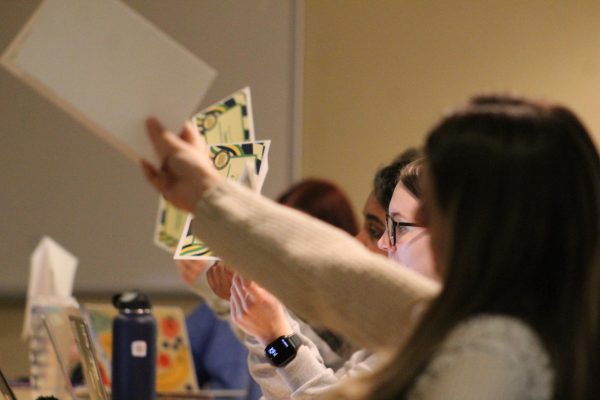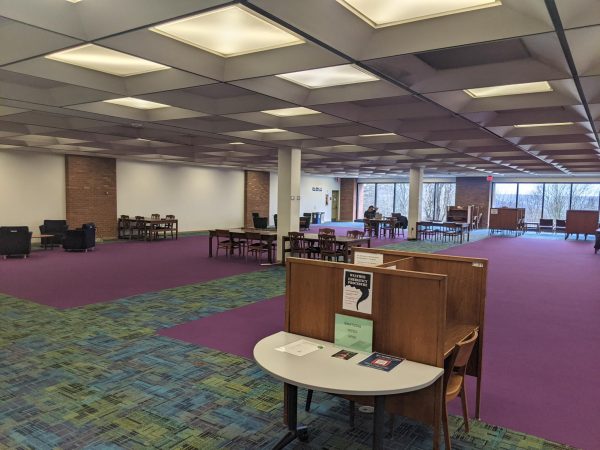Alexis Hart receives Braddock Award
Associate Professor of English and Director of Writing Alexis Hart received the 2017 Braddock Award from the Conference on College Composition and Communication on Feb. 2 for a collaborative journal article entitled “Veterans in the Writing Classroom: Three Programmatic Approaches to Facilitate the Transition from the Military to Higher Education.”
Roger Thompson, an associate professor of writing and rhetoric at the State University of New York at Stony Brook, co-authored the piece with Hart. The article was published in the December 2016 issue of the College Composition and Communication journal.
The Braddock Award is given out once a year for the most “outstanding article on writing or the teaching of writing,” for works published that year in the CCC journal, according to the organization’s website.
Hart said to be chosen as the best work in the journal is an incredible professional achievement.
“It’s the top journal in my field, so it’s a real honor to have our work selected,” Hart said. “Some real visionaries in the field have received this award.”
Hart said she received the news that she and Thompson had won the award via email on Feb. 2. She said she was surprised when she learned the article had been selected.
“I was very pleased to get our article accepted into the journal at all … but then to have it recognized by the broader profession as being the best piece published in the the publication for the year, it was a big surprise,” Hart said.
Thompson said he too was surprised and almost deleted the email without reading it. He said he thought it was a notice to renew his membership.
“It caught us both completely by surprise,” Thompson said.
Jonathan Alexander, an editor at the CCC journal who was on the committee that selected the article for publication, said their work was more than deserving of the award.
Some real visionaries in the field have received this award.
— Alexis Hart
“The authors smartly discuss the learning and literacy needs and challenges of returning veterans, so their article is not only timely but displays the ethical commitment of our field to meet the writing needs of our diverse students,” Alexander wrote in an email.
Jenny Rice, an associate professor of writing, rhetoric, and digital media at the University of Kentucky, who was on the committee that selected the article for the Braddock award, said the commitee was struck by the articles approach to teaching veterans.
“It helped us to better understand how not just to include veterans, but how to draw upon their expertise and experience,” Rice said.
The process of researching their article began in 2010, when Hart approached Thompson about applying for a grant to study how military veterans are assimilated into college classes, especially those involving writing.
Thomson said they began by traveling to over 50 colleges and universities around the country to gather information about how veterans were incorporated into writing classrooms. He said over the course of two years the two traveled extensively together. Despite the constant proximity, Thompson said Hart was easy to work with.
“We work really well together,” Thompson said. “She is just amazing at what she does.”
Hart served as a supply corps officer in the ROTC and spent six years on active duty. Hart’s prior military experience helped as they conducted research, according to Thompson.
“It made people more open to talking to us throughout the whole process,” Thompson said.
While the grant helped to pay for much of their travel, Thompson said they paid for some of it out of their own pockets.
Hart said visiting so many different colleges and universities gave them a better sense of how veterans were being integrated into the classroom on a broad scale. She said they found three main methods for this incorporation.
The first method, according to Hart, was to have classes of just veterans. She said this helped because from the start, each member of the class had a shared experience with every other student. Hart said many veterans often feel as if they have little in common with other students.
“One of the things veterans sometimes say is that because they are coming back as older students with a lot different life experiences than someone who comes straight from high school, is that ‘These are not my peers,’” Hart said. “But if you have a class that is veterans only there might be more of a sense of comradery or that peer connection.”
Hart said the second model being utilized is a “veteran focused” approach in which non-veteran students might join the class, but the topic of the course material focuses on veteran issues, like post-traumatic stress disoreder and health care.
The third model, which Hart said she and Thompson advocated for in their article, is “veteran friendly.” In this model, Hart said the class is meant to make veterans feel welcome in the new environment. She said this means the professor or instructor is sensitive to the different backgrounds veterans are coming into the classroom with, such as their different writing past.
“What we really advocate in this piece is to use an asset-based approach to pedagogy. … So, not thinking about veterans coming in as damaged, or volatile or disordered,” Hart said.
The Braddock award is scheduled to be given out at the CCCC Annual Convention in Portland, Oregon, on Friday, March 17.








